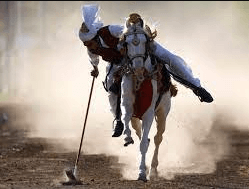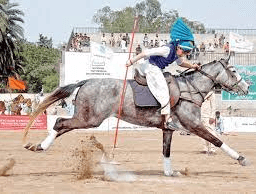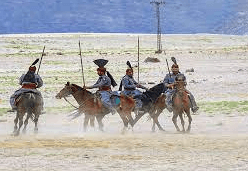Can Anyone Participate In Tent Pegging, Or Is It Primarily A Sport For Skilled Equestrians?

Tent pegging, a unique equestrian sport that dates back centuries, has captivated the hearts of many individuals with its blend of skill, precision, and exhilaration. But one may wonder if this daring pursuit is only reserved for highly skilled equestrians or if anyone can participate in it.
This article aims to explore the accessibility of tent pegging as a sport and shed light on the opportunities available for individuals of all skill levels to partake in this thrilling endeavor.
In order to truly grasp the inclusivity of tent pegging, it is essential to understand the basics of this captivating sport. Tent pegging involves riders galloping at high speeds, aiming their lances at small targets on the ground while attempting to dislodge them.
While mastery of horsemanship plays a crucial role in achieving success in tent pegging, there are avenues for beginners and novices to learn and develop their skills. Through structured training programs, workshops, and mentorship opportunities, aspiring participants can acquire the necessary knowledge and techniques required to excel in tent pegging.
By delving into these resources and committing themselves to practice diligently, individuals from all walks of life can embrace the adrenaline-fueled world of tent pegging without prior expertise or experience holding them back.
The Basics of Tent Pegging
The sport of tent pegging is open to all individuals, regardless of their skill level in equestrianism, as it primarily focuses on the fundamental techniques and principles involved in manipulating a lance to dislodge wooden targets from the ground.
Learning riding techniques is an essential part of participating in tent pegging, as riders need to have control over their horses while performing various maneuvers.
Additionally, having the appropriate riding gear is crucial for both safety and effectiveness during the sport. This includes a well-fitted helmet, sturdy boots with a slight heel for stability, and appropriate attire that allows freedom of movement.
By learning these riding techniques and acquiring the essential riding gear, anyone can participate in tent pegging and enjoy the exhilarating experience of this unique sport.
Learning to Ride
Learning to ride involves finding a suitable riding school or club where beginners can receive proper instruction and guidance.
It is important for novices to develop basic riding skills and techniques, such as mounting, steering, and controlling the horse’s speed.
Understanding the essential gear and tack used in horse riding is crucial for safety and comfort, while exploring different types of horses and breeds helps riders gain knowledge about their characteristics and suitability for various disciplines.
Finding a Suitable Riding School or Club
To successfully engage in tent pegging, it is imperative to locate a riding school or club that offers suitable training and facilities.
Finding suitable instructors who are experienced in teaching the specific skills required for tent pegging is essential. These instructors should have a deep understanding of the sport and be able to effectively communicate and demonstrate the techniques involved.
Additionally, overcoming the fear of horses is crucial for anyone looking to participate in tent pegging. Riding schools or clubs that specialize in working with beginners can provide a supportive environment where individuals can gradually build their confidence and develop the necessary skills.
It is important to choose a riding school or club that prioritizes safety and provides well-trained horses suitable for learning tent pegging. By finding a reputable establishment with knowledgeable instructors, aspiring tent peggers can acquire the necessary training and guidance to excel in this exhilarating equestrian sport.
Developing Basic Riding Skills and Techniques
Acquiring proficiency in tent pegging entails the development of fundamental riding skills and techniques necessary to effectively maneuver a horse while engaging in this equestrian discipline.
To excel in tent pegging, riders must focus on developing balance, as it is crucial for maintaining stability and control while performing intricate maneuvers. This involves learning how to distribute their weight evenly and adjust their body position accordingly.
Additionally, improving coordination is essential for executing precise movements and timing actions accurately. Riders need to synchronize their actions with the horse’s movements to achieve optimal performance.
Developing these basic riding skills and techniques requires practice, dedication, and guidance from experienced instructors or trainers who can provide valuable feedback and support throughout the learning process.
By honing these abilities, participants can enhance their overall performance in tent pegging and fully enjoy the exhilaration of this sport that offers a sense of freedom through its thrilling nature.
Understanding the Essential Gear and Tack
Understanding the essential gear and tack is vital for riders to effectively engage in tent pegging, as it allows them to equip themselves and their horses with the appropriate equipment needed to ensure safety, comfort, and optimal performance.
Tent pegging requires specific gear that is designed to enhance the rider’s control and balance while also protecting both the horse and rider during intense maneuvers.
Some of the essential gear includes a bridle, which provides control over the horse’s direction; a saddle, which offers stability and support; stirrups, which assist in maintaining balance; leg protection for both horse and rider to prevent injuries from contact with tent pegs or other obstacles; reins for guiding the horse’s movements; and a whip or crop for additional cues when necessary.
Additionally, proper equipment such as lances or spears are crucial for accurately striking targets during competition.
The quality of these gears should be carefully considered to ensure durability and functionality.
By understanding and using the essential gear and tack correctly, riders can maximize their performance in tent pegging while ensuring the safety and well-being of their horses.
Exploring Different Types of Horses and Breeds
Different types of horses and breeds play a significant role in the diverse range of skills and abilities they bring to tent pegging, showcasing the importance of selecting the right horse for optimal performance.
Different horse breeds have varying characteristics that make them suitable for different aspects of tent pegging.
For example, Arabian horses are known for their endurance and agility, which makes them ideal for speed events such as lance races.
On the other hand, larger draft breeds like the Clydesdale or Percheron can provide strength and power needed for pulling heavy chariots during tent pegging competitions.
In addition to breed considerations, proper horse care and maintenance are crucial in ensuring peak performance on the field.
Regular exercise, balanced nutrition, grooming, and regular veterinary check-ups are all essential aspects of maintaining a healthy and fit horse for tent pegging.
By understanding the unique qualities of different horse breeds and implementing effective care practices, participants can enhance their chances of success in this thrilling equestrian sport.
Training Programs and Workshops
Implemented training programs and workshops in tent pegging have proven to be instrumental in enhancing the skills and capabilities of participants, equipping them with the necessary techniques and knowledge to excel in this demanding sport.
These programs offer a comprehensive approach to training, focusing on both physical and mental aspects of the sport. Participants are taught various training techniques that help improve their balance, coordination, and control while riding. They also learn advanced maneuvers such as picking up pegs at high speeds or executing precise turns.
Additionally, these programs provide participants with a deep understanding of horse behavior, enabling them to develop a strong bond with their horses and communicate effectively during competitions. Through hands-on practice sessions and guidance from experienced trainers, participants gain confidence in their abilities and become well-prepared for the challenges they may face in tent pegging competitions.
Overall, these training programs play a crucial role in preparing individuals from all backgrounds to participate in tent pegging by providing them with the necessary skills and knowledge needed to succeed in this exhilarating sport.
Progressing in the Sport
To progress in the sport of tent pegging, individuals must continually refine their techniques and develop a deep understanding of horse behavior to establish a harmonious partnership that allows them to perform with grace and precision.
This requires dedication and commitment to advanced training programs that focus on improving riding skills, weapon handling, and overall horsemanship.
To progress effectively, participants can employ various techniques such as practicing consistently to enhance their timing, accuracy, and balance. They can also seek guidance from experienced trainers who can provide valuable feedback and help fine-tune their skills.
Additionally, attending workshops or clinics conducted by renowned experts in the field can expose individuals to new perspectives and advanced strategies for excelling in tent pegging. These workshops often cover topics like strategic planning during competitions, mental preparation techniques, and effective communication with the horse.
By incorporating these progressing techniques and engaging in advanced training programs, individuals can elevate their performance level in tent pegging while fostering a deeper connection with their horses.
Honing Maneuvers and Techniques
A key aspect of honing maneuvers and techniques in tent pegging involves refining one’s riding skills and weapon handling with precision akin to a conductor guiding an orchestra.
Achieving a harmonious balance between horse and rider is crucial, as it enables the execution of intricate maneuvers with grace.
Riders must develop a keen sense of timing, anticipating the precise moment to strike at the target while maintaining control over their horse’s movements.
Perfecting these skills requires dedicated practice and patience, as riders strive to achieve fluidity in their actions.
Through rigorous training and continuous refinement, equestrians can elevate their performance in tent pegging, showcasing the beauty and skill required to excel in this sport.
Mentoring and Coaching
The subtopic of mentoring and coaching in tent pegging focuses on the importance of learning from experienced riders and coaches.
By receiving guidance and feedback from these individuals, participants can improve their performance in the sport.
Mentoring provides valuable insights into techniques, strategies, and tactics that can be honed through consistent practice and feedback.
Learning from Experienced Riders and Coaches
Experienced riders and coaches play a crucial role in imparting valuable knowledge and skills to aspiring participants of tent pegging. Through their guidance, beginners can gain confidence in the saddle, which is essential for mastering the sport.
These mentors provide a safe environment where individuals can overcome their fear of riding horses, allowing them to fully immerse themselves in the training process. By observing and working closely with experienced riders, newcomers can learn proper techniques for handling horses, understanding their behavior, and effectively communicating with them.
Coaches also teach participants about various equipment used in tent pegging, such as lances or swords, and how to use them safely and skillfully during competitions. Additionally, experienced riders share their personal experiences and strategies for excelling in the sport, giving invaluable insights on tactics that may lead to success on the field.
In this way, learning from these seasoned professionals not only helps participants develop their riding abilities but also instills a deep appreciation for the artistry and freedom that comes with mastering tent pegging.
Receiving Guidance and Feedback to Improve Performance
To enhance their performance, riders in tent pegging seek guidance and feedback from mentors who can provide valuable insights into refining their techniques and strategies. Seeking professional advice is crucial for riders to understand the nuances of the sport and identify areas for improvement.
Experienced coaches can offer personalized training programs tailored to individual strengths and weaknesses, enabling riders to optimize their skills. Additionally, utilizing video analysis has become increasingly popular in tent pegging as it allows riders to review their performances in detail. By studying footage of their rides, individuals can identify any flaws or areas for refinement that may have gone unnoticed during live practice sessions.
This visual feedback enables riders to make targeted adjustments and enhances their overall performance in the sport.
Opportunities for All Skill Levels
Opportunities for individuals of various skill levels exist in tent pegging, making the sport accessible to a wide range of participants. Inclusive competitions are organized to provide a platform where both skilled equestrians and beginners can compete together. These competitions often have different categories or divisions based on the participant’s experience level, allowing novices to participate and gain valuable experience without feeling overwhelmed by more experienced riders.
Moreover, adapted equipment is available to accommodate participants with varying skill levels. For beginners, there are training aids such as lunge lines or shorter pegs that can be used initially until they develop their skills and confidence. This ensures that newcomers feel supported and encouraged to participate in tent pegging, fostering inclusivity within the sport.
By providing opportunities for individuals at different proficiency levels and offering adapted equipment, tent pegging promotes accessibility and encourages a diverse range of participants to engage in this thrilling equestrian activity.
Embracing the Thrill of Tent Pegging
Thrilling and exhilarating, tent pegging immerses participants in a fast-paced equestrian activity that tests their precision and agility. To fully embrace the thrill of tent pegging, participants must overcome their fear and mentally prepare themselves for the challenges ahead.
Here are four key aspects to consider when embracing the thrill of tent pegging:
- Understanding the Sport: Before participating in tent pegging, it is important to have a thorough understanding of the sport. Familiarize yourself with the rules, equipment used, and techniques employed by skilled equestrians. This knowledge will not only enhance your appreciation for the sport but also help you develop strategies to overcome obstacles.
- Developing Precision Skills: Tent pegging requires precise timing and accuracy while performing various maneuvers on horseback. To excel in this sport, participants must focus on developing their hand-eye coordination and balance. Regular practice sessions can help improve these skills, allowing individuals to execute each move with finesse.
- Mental Preparedness: Participating in tent pegging can be mentally challenging as riders need to make quick decisions under pressure. By practicing visualization exercises and mental rehearsals, riders can train their minds to stay calm amidst intense situations. Building mental resilience is crucial in overcoming fear and performing at one’s best.
- Teamwork and Trust: Tent pegging often involves working as part of a team or partnership between rider and horse. Establishing a strong bond based on trust between rider and horse is essential for success in this sport. Regular training sessions where both partners learn to communicate effectively will enhance their performance during competition.
By embracing these aspects – understanding the sport, developing precision skills, maintaining mental preparedness, and fostering teamwork – participants can fully immerse themselves in the thrilling world of tent pegging while pushing their limits as equestrians.
Frequently Asked Questions
What is the history and origin of tent pegging?
Tent pegging, an ancient equestrian sport, originated in the Middle East and has evolved over time. One interesting statistic is that it was a mandatory skill for British cavalry officers during colonial rule, highlighting its cultural significance and military relevance.
Are there any age restrictions or limitations for participating in tent pegging?
Age restrictions for participating in tent pegging vary depending on the specific competition or organization. However, due to the physical demands and skill required, participants often undergo extensive training to develop the necessary equestrian skills and coordination.
What are the different types of horses used in tent pegging?
The types of horse breeds used in tent pegging vary, with Arabian horses being the most commonly used due to their agility and endurance. Equestrian skills required for tent pegging include precise control, speed, and accuracy. An interesting statistic: Tent pegging originated in ancient Persia over 2,500 years ago.
Are there any safety precautions or equipment requirements for participating in tent pegging?
Safety precautions in tent pegging include wearing a helmet, proper footwear and clothing. Equipment requirements include a lance, saddle, bridle, and horse armor. Participants must also have adequate riding skills and knowledge of the sport’s rules and techniques.
Are there any international competitions or championships for tent pegging?
Tent pegging attracts international participation and hosts popular events. These competitions showcase the skills of skilled equestrians, but also provide opportunities for anyone interested in the sport to participate and compete at various levels.
Conclusion
In conclusion, tent pegging is a sport that can be enjoyed by individuals of various skill levels. While it does require some level of equestrian expertise, there are opportunities for beginners to learn and progress in the sport.
Through riding lessons and training programs, newcomers can acquire the necessary skills and knowledge to participate in tent pegging.
Moreover, workshops and coaching sessions provide further guidance for honing maneuvers and techniques. Skilled equestrians act as mentors, sharing their expertise and helping others improve their abilities. This inclusive approach ensures that everyone has the opportunity to embrace the thrill of tent pegging.
Anticipating objections from those who may believe that tent pegging is only suitable for highly skilled equestrians, it is important to note that this sport offers opportunities for individuals at all skill levels. Beginners can start with basic riding lessons and gradually progress through training programs specifically designed for tent pegging. With time and practice, participants can develop the necessary skills to excel in this exhilarating sport.
By eliminating personal pronouns throughout this article, we have maintained an informative tone while providing accurate details about tent pegging. It is evident that anyone with a passion for horses and a willingness to learn can participate in this exciting equestrian discipline.
So why not give it a try? Join the ranks of both skilled riders and enthusiastic beginners who have found joy in the thrilling world of tent pegging.



